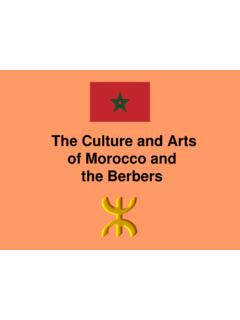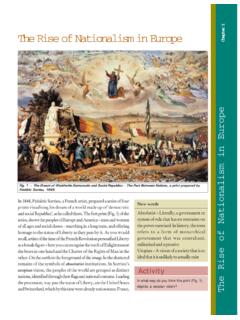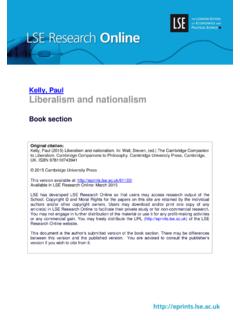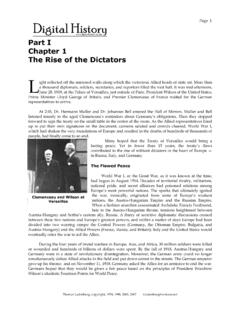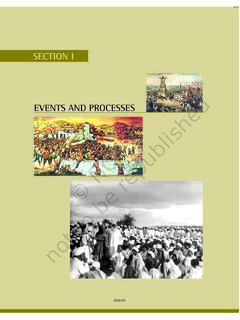Transcription of Overview World War I in the Middle East
1 1 Overview World War I in the Middle East The Middle East played a major role in World War I, and, conversely, the war was important in shaping the development of the modern Middle East. One might even say that World War I began and ended with Middle East-related conflicts. (The beginning, the event that formed the immediate cause of the war, was the assassination of the Austro-Hungarian Archduke Franz Ferdinand by a group of Bosnian high school students in June 1914, and that assassination was a direct result of the long process of separating Balkan countries from the fading Ottoman Empire. The end, the last treaty arising from the war nearly five years after it ended, was the 1923 Treaty of Lausanne, ending the conflict with Turkey that arose from the failed Treaty of Sevres in 1920 that was supposed to have ended World War I in the Middle East.) Since Middle Eastern issues are so important in World War I, and World War I is so important in understanding modern Middle Eastern history, isn t it surprising that teachers/students don t study very much about history of the war in that area of the World ?
2 (Could it be because most of the significant events in that area occurred without American involvement mostly before and after the involvement in the war? Or could it be that we just have a European/American-centered view of the war?) Regardless, here is a brief Overview of some of the events and issues of World War I in this key region of the World . Middle Eastern issues and the origins of the war (why a group of Bosnian teenagers were gunning for an Austrian archduke and what that had to do with the Middle East and a World war): If you had been a European or American living in 1914 who was interested in foreign affairs, you would undoubtedly have been debating the Eastern Question : the future of the areas that still remained part of the Ottoman Empire. Every educated person living in 1914 knew that, after 600 years as a World power, the once great Ottoman Empire was struggling to adjust to changing times.
3 Many people were calling it the sick man of Europe and questioning whether the sick man s death would lead to a major war among the European powers. Yet, people had been worrying about the Eastern Question for the past century and a half. Why was the issue an especially dangerous problem in 1914? The answers for this are complicated, but three factors in particular are relevant to this discussion. Each of them involves the Great Powers of Europe: Great Britain, France, Germany, Austria-Hungary, and Russia. (Remember that the was not yet considered a great power. ) First, these powerful European countries were engaged in a race for foreign colonies in order to expand their economic and political influence. The declining Ottoman Empire contained many areas that they all wanted to control: the Turkish Straits, for example, because of their strategic significance, the Arab lands because of their resources and location along the Mediterranean, and the Balkan Peninsula because of its location in Europe.
4 2 Second, two of the powers Austria-Hungary and Russia were multi-national empires in a time in which modern nationalism was making their political structure and organization seem very outdated. The Austrian Empire was particularly threatened by Serbian nationalism in the Balkans because Austria-Hungary contained millions of people who spoke some dialect of the Serbo-Croatian language, and some of them were talking of breaking away and uniting them with Serbia. This possibility worried the Austrian leadership, who then wanted to take over formerly Ottoman territories in Europe, like Bosnia. (This was not because the Austrians really wanted more Serbian-speaking people in their empire, but because they didn t want Serbia to have those lands and become more powerful.) Russia, of course, priding itself on being the protector of Orthodox Christians, backed up Serbia and its interests. The result: any problem in the Balkans would easily lead to a bigger war between Russia and Austria.
5 This brings us to the third factor: the newly consolidated alliance system, pitting Austria, Germany, and Italy, on one side, against Great Britain, France, and Russia, on the other. This meant that if Austria were to go to war with Russia, Germany and Italy would back Austria, while Great Britain and France would rush to the defense of their ally, Russia. In other words, everyone knew in 1914 that a small spark could ignite a really big war. Another thing that everyone knew in 1914 was that war was coming and that it would probably begin in the Balkans. Actually, there had been almost continuous conflict in the Balkans for just over a century. Yet far from lessening, the conflicts just seemed to be intensifying in the early years of the 20th century. In 1908 Austria had formally annexed Bosnia-Herzegovina, a previously Ottoman province that it had occupied since the 1870s. This act had enraged nationalists throughout the Balkans and intensified the hatred between Austria and Serbia.
6 Then, there were the two Balkan Wars of 1912 and 1913, which involved several of the small Balkan countries and the Ottoman Empire. (Later, some people would dub World War I the Third Balkan War. ) By 1914 Bosnia was a center of unrest, especially among the small educated part of the population, most of whom were young people in their teens and twenties. (Many Bosnians were illiterate, so high school students and the few young people studying at universities in other countries were the intellectual elite of Bosnia.) These young people wanted political and social change and they wanted change FAST! The Young Bosnia movement, a loose collection of secret societies, sprang up in local high schools and its members sought connections with like-minded South Slavic ( Yugoslav ) young people within Austria-Hungary and Serbia. (Note that all Bosnians speak a dialect of the same language as the Serbs, and Bosnians of the Orthodox Christian religion, then the largest group in Bosnia, even considered themselves to be Serbs.)
7 With no army or government of their own, these youthful revolutionaries knew that change could only come about through an intervention of powerful countries like Russia or Britain. In their view, the only way to get this intervention would be in the event of a crisis. Many of them believed that the quickest way to provoke a crisis was through political assassination assassinating an Austrian political leader would lead to Austrian intervention in Bosnia, which would lead to Russian intercession in Bosnia s behalf. It seemed to make perfect sense, 3 especially when news got out that the heir to the Austrian throne would parade through the streets of Sarajevo on a day that would particularly offend the Serbs: the anniversary of the day on which they had lost their independence to Ottoman conquerors. (You can imagine that much of the population of Bosnia would be outraged to see a parade by another conqueror on that day of mourning!)
8 The assassination of Franz Ferdinand was not the work of one or even two students: it was a conspiracy that directly involved dozens of people and indirectly involved many, many more. Six young people (five of whom were high school students between the ages of 16 and 19) went to the parade carrying weapons and intending to kill the royal visitor; others assisted or at least knew about the plot; a number of officials from Serbia (one of whom was a member of the government of Serbia though he was acting without the authorization of his government) supplied the weapons and other assistance. No one was surprised that the assassination took place and that it led to a war! However, it was a great shock to the students involved in the plot and to most other people at the time that the war turned out to be so long and so incredibly bloody. The killing of the archduke and his wife set off a chain of events: Austria attacked Serbia; Russia backed Serbia; the alliance system came into play pulling Britain and France in on Russia s side and Germany in on Austria s.
9 Not to be outdone, the Ottoman Empire joined in too on the side of the Central Powers (Germany, Austria). The Great War had begun. The Middle East during the war (from military campaigns to hunting locusts, from an Arab revolt to the Armenian genocide): The Middle East was directly involved in World War I, and so it was affected by the war in all aspects of life. The most immediate impact was on young men: Turks, Kurds, Armenians, Arabs and others fought as part of the Ottoman army. They fought against Russian troops along the northeastern border of the empire and against Anzac (Australian, New Zealand) troops in the Turkish straits (the great battle of Gallipoli). They fought British troops from Great Britain itself and the British commonwealth along with troops from various parts of the empire (India, Africa), that massed in Egypt and campaigned throughout the Arab lands (Egypt, Palestine, Lebanon, Syria, Arabia, Iraq).
10 Although the Ottomans won a number of important battles (such as Gallipoli), they also lost a lot of men. In addition to combat, all the forces fighting in the Middle East on both sides struggled with disease (spread by war) and scarcity of water and supplies. Ottoman commanders, fighting to protect their own territory, also had to contend with local administrative issues, such as an infestation of locusts in Palestine. In addition to all this, the Ottoman Empire along with other multi-national empires such as its ally Austria-Hungary and its enemy Russia found itself facing internal unrest from its national minorities. In the case of the Ottoman Empire, Great Britain used Arab dissatisfaction with Ottoman rule to the advantage of the Allied cause the divide and conquer approach. First, they made a deal with the Arabs. As early as 1915, Britain had opened negotiations with 4 Sharif Hussein of Saudi Arabia, promising Hussein that after the war, he would rule a large Arab country that would presumably include most of the lands between Persia and Egypt (including today s Iraq, Syria, Lebanon, Palestine/Israel, Jordan, Saudi Arabia, and other countries).







